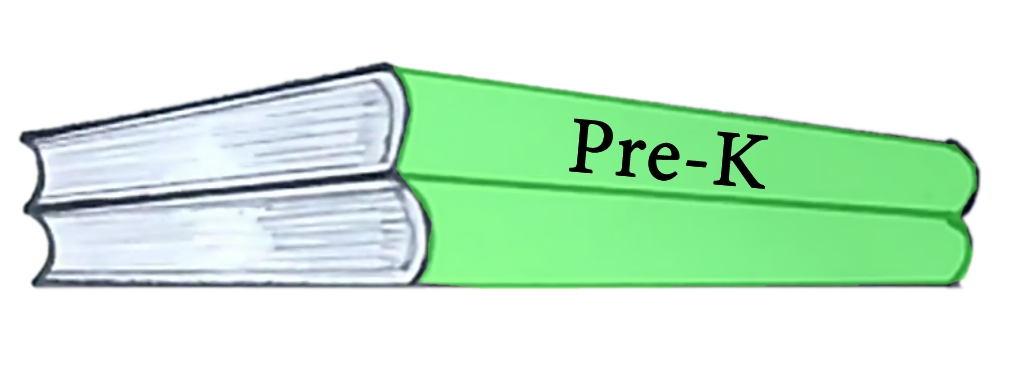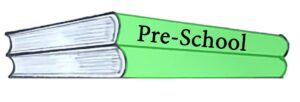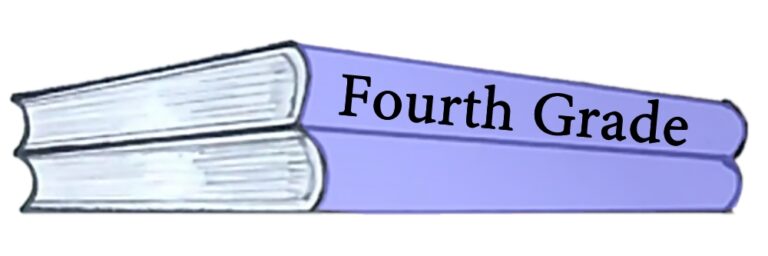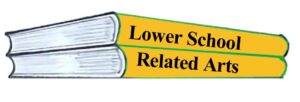Lower School
Creating Lifelong Learners on the Road to College Success
The ages of 3-10 are a critical period in a child’s education. Providence St. Mel School fosters a nurturing environment focusing on maximizing their intellectual, social, and emotional growth through a rigorous academic curriculum, personalized learning, and a strong emphasis on character development and community engagement.
A Modern, Technology-Driven Curriculum focusing on Core Subjects
We believe that early success in education relies on a strong foundation in core areas such as Reading, Math, and Science. Our proven teaching methods, combined with state-of-the-art online tools, create a comprehensive learning environment that increases skills and confidence with every grade level.
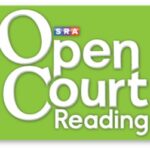
Open Court Reading is a comprehensive, research-based reading curriculum specifically designed for elementary students. It emphasizes a systematic approach to phonics, along with vocabulary, reading comprehension, and writing skills. Open Court Reading uses a combination of direct instruction, practice, and assessments to help students develop strong foundational reading abilities.
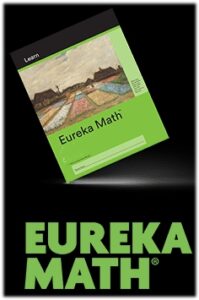
Eureka Math is a comprehensive math curriculum designed to align with the Common Core State Standards. It emphasizes deep conceptual understanding of math, rather than rote memorization or procedural practice. The curriculum breaks down complex math concepts into manageable components, building students’ skills progressively from basic operations to advanced problem-solving.
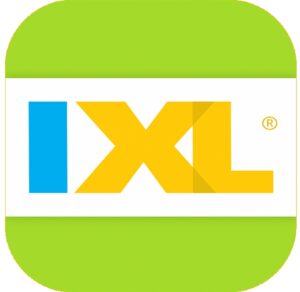
IXL provides comprehensive, standards-aligned educational content to supplement our Math programs. For elementary school Math education, IXL offers a highly interactive experience, designed to strengthen core math skills through personalized practice, immediate feedback, and engaging activities.
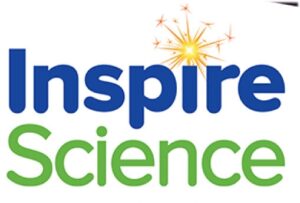
Inspire Science is a comprehensive science education program designed for elementary school students. It aligns with the Next Generation Science Standards (NGSS) and aims to foster critical thinking, inquiry, and hands-on learning. The program integrates science, technology, engineering, and math (STEM), providing students with engaging, age-appropriate content that emphasizes real-world applications of scientific concepts.
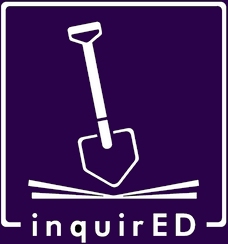
InquirED is a comprehensive, digital social studies curriculum that engages students by moving beyond traditional textbook learning. InquirEd encourages students to explore complex social studies topics through sustained investigations, helping them build critical thinking, research, and communication skills.
Our Pre-K through 5th Grade Model Guides Students to Mastery at Every Stage
At PSM, each grade level is carefully designed to build upon the previous one, ensuring a seamless progression that maximizes student growth and achievement.
Enrichment and Engagement
PSM recognizes that activities beyond the core curriculum, like extracurriculars, field trips, and parent engagement, play an important role. These activities promote well-rounded development, offering students opportunities to apply what they’ve learned in real-world settings, build social and leadership skills, and strengthen connections between families and schools to promote success both inside and outside the classroom.
Parent Days
Parents are invited to participate in special days like Mother’s Day, Halloween and Christmas. PSM families participate in games, activities and shared learning to ensure a supportive environment for their children.
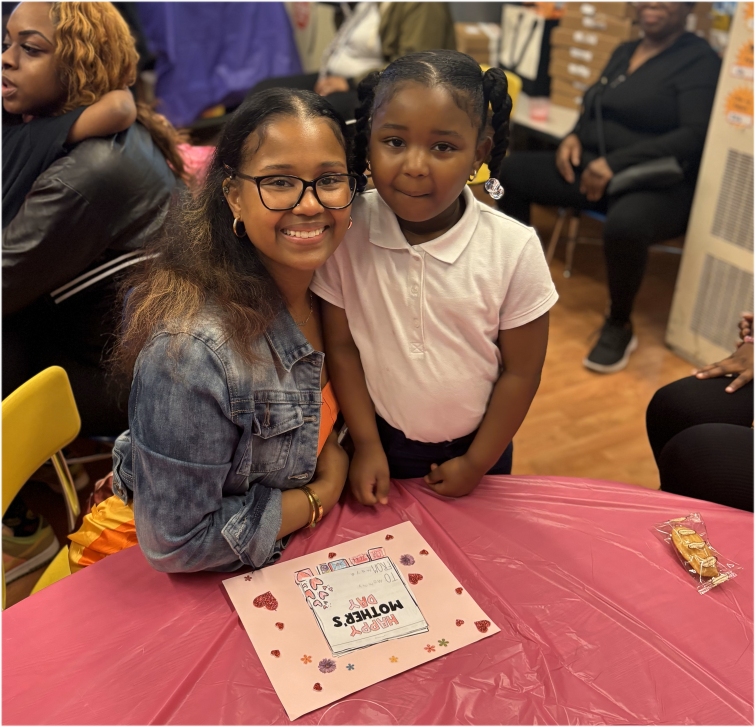
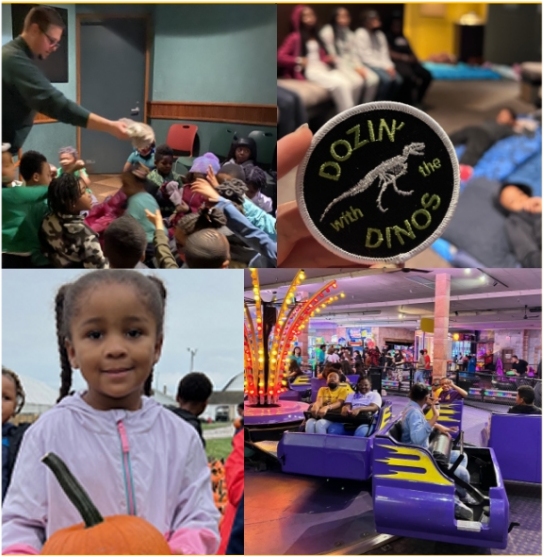
Field Trips
Providence St. Mel Pre-School
Building a foundation for success with our earliest learners.
A strong start in Pre-School is critical, as it lays the foundation for future academic success by fostering essential cognitive, social, and emotional skills that children build upon throughout their school years. Early childhood education not only enhances readiness for formal schooling but also influences long-term outcomes in learning and personal development.
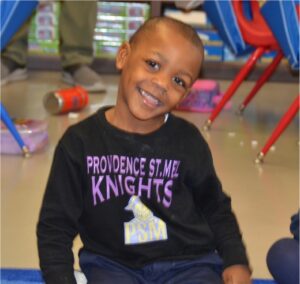
Curriculum
INTRODUCTION TO READING, WRITING, AND LANGUAGE CONCEPTS
The Wright Skills reading program is used for Reading/Language Arts/Writing at the Preschool level.
The Handwriting Without Tears curriculum incorporates unique strategies to work with diverse learning styles; teaching simple skills first then building on prior knowledge. Letters are taught in a sequence that makes sense developmentally: in groups of similar formations. Students develop writing skills through multi-sensory play-based instruction. Activities with hand-on materials address different senses to teach correct formation, spacing, sequencing, and other writing skills. By the end of the academic year, Preschool students will be able to write their first name using uppercase letters, recognize A-Z uppercase letters, and provide a word and coordinating sound for each letter. Students will be able to write letters correctly on lined paper. Students are exposed to concept maps after every reading lesson. They will be introduced to rhyming words, compound words, opposites, and sequencing. They will be able to explain the author’s and illustrator’s purposes.
INTRODUCTION TO MATHEMATICS
The Growing with Mathematics program reflects current cognitive and social theories of early mathematics learning. The program views children as active learners working towards constructing their own mathematical understandings through interacting with their environment and their peers. Students will engage in purposeful activities encouraging all to interact and develop respectful strategies for working with peers in pairs and small groups to complete activities, which will enable them to make mathematical connections through mathematics center-based experiences and whole-group discussions. Each lesson concept is designed to provide carefully sequenced mathematics, which will reflect active experimentation; direct, hands-on experiences to make learning meaningful; extended language development fostered by social interactions; and active learning through experimenting, imagining, and creating. The children will learn how to find the language to describe their mathematical thinking.
INTRODUCTION TO SCIENCE
Preschool students in Social Studies program will focus on themes of communities at home, school and neighborhoods; our city, state, country and major countries from around the world; holidays and celebrations; and key contributors in making our world a better place, time and people. By the end of the academic year, Preschool and Pre-Kindergarten students will be able to state their first and last name and their birth dates. They will be able to tell the names of family members and what they do for a living. They will be able to recognize community workers, different kinds of transportation, and holiday traditions celebrated during the year in our country.
INTRODUCTION TO TECHNOLOGY/S.T.E.M.
Pre-School students
will be introduced to technology from day one. For visual understanding, a
classroom iPad is used daily within lessons in all core concepts to enhance
lesson offerings via songs, short videos and learning apps. Students will be introduced to a computer
keyboard and learn pre-keyboarding skills, such as identifying and typing
letters; specifically, those found in their first names. Students will visit
computer lab once per quarter to be introduced to and to help them follow basic
computer handling guidelines and rules. Also, students are introduced to
coding. By end of the year, students will be able to identify and understand a
specific product from a picture/model used throughout quarter four. Pre-School
and Pre-Kindergarten students will get chance to participate in National
Engineering Week.
RELATED ARTS
Music
Activities are designed to follow whole group or small group instruction. Both grade levels partake in the Music LEAPS Suzuki-Orff Program, which builds a foundation of experiences that facilitate self-expression and creativity for children through instrument play, songs, and movement. It also draws on creative repetition and progressive skill-development to facilitate cognitive learning. Curriculum and songs correlate with the current season. Instrument play is incorporated using several small percussion instruments. Drums, sand blocks, rhythm sticks, and triangles are used throughout the curriculum. Based on the Orff approach, movement is also a large part of the program. Circle games and movement activities are included in all lessons to enhance the understanding of basic musical concepts.
Art
Activities focus on the reinforcement and expansion of class concepts, while using various forms of expression. The emphasis is on creativity, exposure to multiple textiles, and the development of fine motor skills.
Providence St. Mel Pre-Kindergarten
Setting the stage for a successful future through creation, inquiry, interaction and play
Our Pre-K learning curriculum program prepares children for elementary school and beyond by developing important academic, social and emotional skills. Children engage in unique learning activities that capture their imaginations and inspire them to explore.

Curriculum
READING, LANGUAGE ARTS, and WRITING
Pre-School students will be introduced to technology from day one. For visual understanding, a classroom iPad is used daily within lessons in all core concepts to enhance lesson offerings via songs, short videos and learning apps. Students will be introduced to a computer keyboard and learn pre-keyboarding skills, such as identifying and typing letters; specifically, those found in their first names. Students will visit computer lab once per quarter to be introduced to and to help them follow basic computer handling guidelines and rules. Also, students are introduced to coding. By end of the year, students will be able to identify and understand a specific product from a picture/model used throughout quarter four. Pre-School and Pre-Kindergarten students will get chance to participate in National Engineering Week.
The Imagine It curriculum incorporates critical literacy skills throughout the following components: phonological and phonemic awareness, alphabetic knowledge and principle building. Themed literature selections lay the foundation for early reading and print awareness. By the end of the academic year, Pre-Kindergarten students will be able to recognize characters in the story, write upper and lowercase letters, write three word sentences, read sight words, use two correct punctuation marks (period and question mark), read and spell basic color words, provide the correct opposite for specific words, and locate/recognize/create rhyming and compound words. is comprised of comprehensive skills instruction which sequentially teaches students phonological and phonemic awareness, oral language, letter recognition and formation introduction, concepts in print, phonics and word study.
MATHEMATICS
The Real Math program by SRA/McGraw-Hill program is used for Math at the Pre-Kindergarten level. Pre-Kindergarteners are exposed to the Real Math program by SRA/McGraw-Hill. This series develops all standards of mathematical proficiency and provides opportunities for practice of all concepts introduced: numbers and their operations, geometry, measurement, patterns, algebra, data analysis and classifications. By end of the year, Pre-Kindergarten students will be able to recognize and count numbers 0-100. They will be able to recognize and work with shapes. They will be introduced to simple addition and subtraction skills as well as how to interpret and analyze data found in different types of graphs.
SCIENCE
The Real Math program by SRA/McGraw-Hill program is used for Math at the Pre-Kindergarten level. Pre-Kindergarteners are exposed to the Real Math program by SRA/McGraw-Hill. This series develops all standards of mathematical proficiency and provides opportunities for practice of all concepts introduced: numbers and their operations, geometry, measurement, patterns, algebra, data analysis and classifications. By end of the year, Pre-Kindergarten students will be able to recognize and count numbers 0-100. They will be able to recognize and work with shapes. They will be introduced to simple addition and subtraction skills as well as how to interpret and analyze data found in different types of graphs.
SOCIAL STUDIES
Pre-Kindergarten students in Social Studies program will focus on themes of communities at home, school and neighborhoods; our city, state, country, and major countries from around the world; holidays and celebrations; and key contributors in making our world a better place, time, and people. By end of the academic year, Preschool and Pre-Kindergarten students will be able to state their first and last name and their birth dates. They will be able to tell the names of family members and what they do for living. They will be able to recognize community workers, different kinds of transportation, and holiday traditions celebrated during the year in our country.
TECHNOLOGY/S.T.E.M.
Pre-Kindergarten students will be introduced to technology from day one. For visual understanding, a classroom iPad is used daily within lessons in all core concepts to enhance lesson offerings via songs, short videos and learning apps. Students will be introduced to a computer keyboard and learn pre-keyboarding skills, such as identifying and typing letters; specifically, those found in their first names. Students will visit computer lab once per quarter to be introduced to and to help them follow basic computer handling guidelines and rules. Also, students are introduced to coding. By end of the year, students will be able to identify and understand a specific product from a picture/model used throughout quarter four. Pre-School and Pre-Kindergarten students will get chance to participate in National Engineering Week.
Providence St. Mel Kindergarten
The first step toward lifelong learning
Kindergarten serves as a crucial bridge between Preschool and Elementary School, helping children develop essential social, emotional, and academic skills that ease the transition to more structured learning environments.
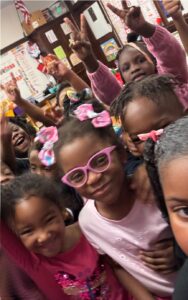
Curriculum
READING, LANGUAGE ARTS, and WRITING
The Open Court Reading Program begins in Kindergarten. It is a research-based comprehensive reading, writing, and language arts program. Using systematic, explicit instruction, this program helps all students master the foundational skills needed not only to move to proficiency, but also to achieve greater goals of reading independently with confidence inside and outside the classroom. The children begin using Pre-Decodable Books, followed by Decodable Books and ultimately reach their first reader which help students in kindergarten transition from teacher-led instruction to independent reading. Students can access materials in print and digitally. Kindergarten Themes include: Off to School, Let’s Be Kind, What’s the Weather, Pushes and Pulls, Home Sweet Home, Our Country, Our Cultures, Ready, Set, Grow, Animal Homes, Rules We Follow, Great Americans, Color Your World, Stripes, Spots, and Dots.
MATHEMATICS
Kindergarten incorporates the Math Expressions curriculum; a web-based, digitally connected program that uses hands on manipulatives and teaches students to solve addition and subtraction problems using a variety of strategies and techniques. There are five crucial classroom structures that allow Kindergarten children to develop deep conceptual understanding, then practice, apply, and discuss what they know with skill and confidence. Daily Routines and Quick Practice involve whole class responses or individual partner practice, provide daily review, and are sometimes led by student leaders. Math Talk is used to have students share strategies and solutions orally and through drawings. Students will practice explaining their thinking and listening to others. Objects or manipulatives, drawings, conceptual language, and real-world situations will strengthen mathematical concepts and understanding. A helping community in the classroom provides an environment for students to be both teachers and learners and develop the confidence to take risks in their thinking. Student Leaders support student growth by helping them to learn to lead practice and discussion routines. Kindergarten units include topics covering the following core concepts: understanding numbers 1-10; exploring 5-groups; teen numbers as tens and ones; math partners, problem drawings, and tens; consolidation of concepts; money, time, measurement, and numbers.
SCIENCE
Inspire Science is designed to spark student interests and empower them to ask more questions, think critically, and maximize their ability to creatively solve problems. The Inspire Science instructional model contains comprehensive learning experiences to pique the
interest of our students. The program will be used to help inspire the next
generation of innovators, visionaries, and inventors. Through user-friendly
experiences, the students will be exposed built-in literacy and math
connections, including full STEM opportunities, containing web-based, digitally
accessible content promoting a hands-on program, that will allow students to
explore the concepts of energy, light and sounds, plants and animals, and earth
and space through simulations and real, hands-on learning experiments. Students
will be able to solve science and engineering challenges using math skills
including: analyzing data and creating graphs. Students will be able to achieve
and demonstrate greater understanding through hands-on science and engineering
activities using the engineering design process. Students will be able to
continue to build close reading, writing, and communication skills while
learning about exciting science ideas and developing presenting solutions to
real-world challenges. Students will be expected to complete one research project
quarterly, based on social studies and/or science, STEM themes.
SOCIAL STUDIES
Kindergarten students will learn about the foundational concepts of identity, diversity, cooperation, and citizenship through the Impact Social Studies Curriculum. Themes are woven into a discovery of significant places and historical events. Children will also be introduced to using primary sources, maps, and timelines to learn about the world around them. Kindergarten Chapters/Themes include: How do people learn and work together?; Where do we live?; What does it mean to be an American?; How has our world changed?; and Why do people have jobs?
TECHNOLOGY/S.T.E.M.
Students will be introduced to the importance of using technology safely along with concepts of growing into digital citizens. Students will be introduced to coding terminologies. Kindergarten students will partner with First grade students as S.T.E.M. Buddies to work weekly to design, create, build and test different structures focused on themes within our curriculum and US calendar. A SMART Board is integrated daily to enhance instruction. Kindergarten participates in National Engineering Week.
Providence St. Mel First Grade
Building confidence and self-reliance
The goal of our first grade program is to help our young learners become more confident individuals, develop socially, and grow in empathy for others while becoming more independent and responsible.
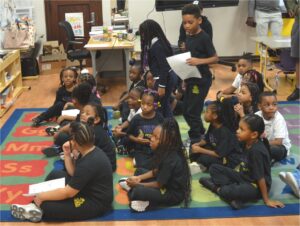
Curriculum
READING, LANGUAGE ARTS, and WRITING
The Open Court Reading Program continues from Kindergarten into First Grade. It is a research-based comprehensive reading, writing, and language arts program, which uses systematic, explicit instruction, this program helps all students master the foundational skills needed not only to move to proficiency, but also to achieve greater goals of reading independently with confidence inside and outside the classroom with full digital/web-based access. The Grade 1 Student Anthology includes a variety of narrative and informative texts to help students understand concepts such as: key ideas and details; writing as a craft; and the integration of background knowledge and ideas. Student Anthologies are available digitally with audio for fluency and vocabulary support.1st Grade Themes include: Back to School, Be My Friend, Science Cycles, Light and Sound, Around Our Town, Around Our World, Roots and Seeds, Animals from Head to Toe, Red, White and Blue, Stars and Stripes, and Art for All.
MATHEMATICS
Math Expressions uses hands on manipulatives and teaches students to solve addition and subtraction problems using a variety of strategies and techniques. At the beginning of first grade, the students practice building and solving number sentences using the math partner strategy. As these skills develop throughout the year, first graders are able to apply partner strategy to solve two-digit addition and subtraction problems with regrouping. By the end of First grade, students are expected to be able to solve story problems, identify 2 dimensional and 3 dimensional shapes, measure objects using nonstandard units of measurement. Graph and comparing data. First grade units include topics covering the following core concepts: Early Number Activities; Operations and Simple Equations; Story Problem; Strategies; Basic Ten-Structured Concepts; Ten-Structured Applications; Comparisons and Data Formats; Fractions, Circle Graphs, and Clocks; Money and 2-Digit Addition; Analyze Story Problems; Measurement, Rounding, and Shapes. Students will use iPads daily to access and practice core concepts.
SCIENCE
Inspire Science is designed to spark student interests and empower them to ask more questions, think critically, and maximize their ability to creatively solve problems. Inspire Science’s instructional model contains comprehensive learning experiences to pique the interest of our students. The program will be used to help inspire the next generation of innovators, visionaries, and inventors. Through user-friendly experiences, students will be exposed built-in literacy and math connections, including full STEM opportunities, containing web-based, digitally accessible content promoting a hands-on program, that will allow students to explore the concepts of energy, light and sounds, plants and animals, and earth and space through simulations and hands-on learning experiments. Students will be able to solve science and engineering challenges using math skills including: analyzing data and creating graphs. Students will be able to achieve and demonstrate greater understanding through hands-on science and engineering activities using the engineering design process. Students will be able to continue to build close reading, writing, and communication skills while learning about exciting science ideas and developing presenting solutions to real-world challenges.interest of our students. The program will be used to help inspire the next
generation of innovators, visionaries, and inventors. Through user-friendly
experiences, the students will be exposed built-in literacy and math
connections, including full STEM opportunities, containing web-based, digitally
accessible content promoting a hands-on program, that will allow students to
explore the concepts of energy, light and sounds, plants and animals, and earth
and space through simulations and real, hands-on learning experiments. Students
will be able to solve science and engineering challenges using math skills
including: analyzing data and creating graphs. Students will be able to achieve
and demonstrate greater understanding through hands-on science and engineering
activities using the engineering design process. Students will be able to
continue to build close reading, writing, and communication skills while
learning about exciting science ideas and developing presenting solutions to
real-world challenges. Students will be expected to complete one research project
quarterly, based on social studies and/or science, STEM themes.
SOCIAL STUDIES
First Grade students will learn about the United States and the people that make it great through the Impact Social Studies Curriculum. They understand how to learn about history, move into geography and where we live. Discovery continues with the people who make our country, from the founders to the many cultures that shaped our nation. Finally, students learn about the economics of work and trade. First Grade Chapters/Themes include: What Are the Rights and Responsibilities of Citizens?; How Can We Describe Where We Live?; How Do We Celebrate Our Country?; How Does the Past Shape Our Lives?; and Why Do People Work?
TECHNOLOGY/S.T.E.M.
First grade engineers will work, plan, build and dream, in that order. First graders will learn the importance of using technology safely by becoming a digital citizen. Students will work on the beginning stages of coding by creating mapping puzzles and learning terminology. First grade students partner with Kindergarten students as STEM Buddies to work weekly to design, create, build and test different structures focused on themes within our curriculum and US calendar. A PROMETHEAN Touch Screen is integrated daily to enhance instruction. First grade participates in Engineering Week.
Providence St. Mel Second Grade
A Year of Growth, Curiosity, and Exploration
The goal of our first grade program is to help our young learners become more confident individuals, develop socially, and grow in empathy for others while becoming more independent and responsible.

Curriculum
READING, LANGUAGE ARTS, and WRITING
The Open Court Reading Program continues from First into Second Grade. It is a research-based comprehensive reading, writing, and language arts program, which uses systematic, explicit instruction, this program helps all students master the foundational skills needed not only to move to proficiency, but also to achieve greater goals of reading independently with confidence inside and outside the classroom with full digital/web-based access. Two Student Anthologies include a variety of diverse narrative and informative text selections to help students build their understanding of concepts such as: key ideas and details; writing as a craft; and the integration of knowledge and ideas. Grade 2 Student Anthologies are available digitally with audio for added fluency and vocabulary support. 2nd Grade Themes include: Teamwork, Earth in Action, My Community at Work, Plants and Animals, Citizenship, Story Time.
MATHEMATICS
Math Expressions is a web-based, digitally connected curriculum that uses hands on manipulatives and teaches students to solve addition and subtraction problems using a variety of strategies and techniques. Second grade units include topics covering the following core concepts: Understanding Addition and Subtraction; Measurement and Shapes; Solving Story Problems; Quadrilaterals; Addition to 200; Time; Tables and Graphs; Diagonals and Midpoints; Subtracting; 2-digit Numbers; Shapes and Patterns; 3-Digit Addition and Subtraction; Metric Measurement and 3-D Shapes; Multiplication and Fractions; and Non-standard and Standard Units of Measure. Students will use iPads daily to access and practice core concepts.
SCIENCE
Inspire Science is designed to spark student interests and empower them to ask more questions, think critically, and maximize their ability to creatively solve problems. The Inspire Science instructional model contains comprehensive learning experiences to pique the interest of our students. The program will be used to help inspire the next generation of innovators, visionaries, and inventors. Through user-friendly experiences, the students will be exposed built-in literacy and math connections, including full S.T.E.M. opportunities, containing web-based, digitally accessible content promoting a hands-on program, that will allow students to explore the concepts of energy, light and sounds, plants and animals, and earth and space through simulations and real, hands-on learning experiments. Students will be able to solve science and engineering challenges using math skills including: analyzing data and creating graphs. Students will be able to achieve and demonstrate greater understanding through hands-on science and engineering activities using the engineering design process. Students will be able to continue to build close reading, writing, and communication skills while learning about exciting science ideas and developing presenting solutions to real-world challenges. Students will use iPads daily to access and practice core concepts.
SOCIAL STUDIES
econd Grade students will be given the tools to investigate where they live, including its history, geography economy, and government through the Impact Social Studies Curriculum. They will learn about people who have made an impact on the world and explore ways that they can impact their own world as well. Connections between their community’s past and present are encouraged as they prepare for roles in their community’s future. Second Grade Chapters/Themes include: Why Is It Important to Learn About the Past?; How Does Geography Help Us Understand Our World?; How Do We Get What We Want and Need?; Why Do We Need Government?; How Can People Make a Difference in Our World?
TECHNOLOGY/S.T.E.M.
Second Graders will enhance technology skills with daily use and incorporations of iPads, quarterly research projects, and periodic use and practice of computer labs for additional S.T.E.M. activities. A PROMETHEAN Touch Scree is integrated daily to enhance instruction. Second grade participates in National Engineering Week.
Providence St. Mel Third Grade
A Year of Growth and Discovery
Third grade goals aim to create well-rounded, engaged learners who are prepared for the challenges of higher grades.
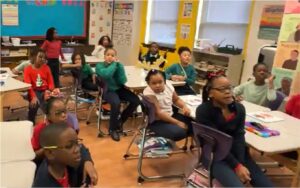
Curriculum
READING, LANGUAGE ARTS, and WRITING
MATHEMATICS
SCIENCE
Students will integrate technology, engineering, and various field trips to enhance and teach core concepts of life, earth, and physical science. Students study plants, animals, cycles on the Earth and in Space, forces, motion, matter, and energy. Through hands-on learning experiences, reading, and note taking students in this course gain a deeper understanding of the world around us, and what it means to be a scientist.
SOCIAL STUDIES
Third Grade students will learn about the impact geography, culture, history, government, and economics have across the globe and in their very own community through the Impact Social Studies Curriculum. Students will engage with maps, primary sources, timelines, and different perspectives to build citizenship skills and gain an understanding of the forces that shape their community locally and globally. Third Grade Chapters/Themes include: Why Does It Matter Where We Live?; What Is Our Relationship to Our Environment?; What Makes a Community Unique?; How Does the Past Impact the Present?; Why Do Governments and Citizens Need Each Other?; and How Do People in a Community Meet Their Wants and Needs?
TECHNOLOGY/S.T.E.M.
Students will take weekly trips to the computer lab to type up a final draft that they wrote in throughout the week. These weekly trips focus on computer proficiency and typing skills. Third graders also use their iPad daily across all curriculums. A SMART Board is integrated daily to enhance instruction. Third grade participates in National Engineering Week.
Providence St. Mel Fourth Grade
A year of exploration and growth, critical thinking, and greater independence.
Fourth graders continue to focus on making meaningful connections between what they learn in class and their lives outside of school.

Curriculum
READING, LANGUAGE ARTS, and WRITING
The Open Court Reading Program continues from Third into Fourth Grade. It is a research-based comprehensive reading, writing, and language arts program, which uses systematic, explicit instruction. This program helps all students master the foundational skills needed not only to move to proficiency, but also to achieve greater goals of reading independently with confidence inside and outside the classroom. The Student Anthology includes a variety of diverse narrative and informative texts to help students understand concepts such as: key ideas and details; writing as a craft; and the integration of background knowledge and ideas. The Grade 4 Student Anthology is available in print and digitally with audio. 4th Grade Themes include: Making a Difference, Science Fair, Our Heritage, Our History, Adaptations in Action, National Treasures, Literature Meets Art.
MATHEMATICS
Eureka Math2® is a knowledge-building PK–Algebra I curriculum that blends print and digital formats. Eureka Math² provides consistent math models, rigor to support the productive struggle, and coherence across grades from Eureka Math®. This program provides digital interactives, increased opportunities for student discourse, and flexibility to make math instruction exponentially teachable and engaging. Lessons and modules are intentionally organized to leverage connections between concepts, and progress conceptual understanding to help students access new learning and problem solving. Through intentional integration of digital resources, a focused approach to encouraging student discourse, and by connecting lessons to real-world math, students stay engaged in the learning.
SCIENCE
Students will integrate technology, engineering, and various field trips to enhance and teach core concepts of physical and earth science. Students study microbiology, learning the basic structures and functions of cells, as well as how these cells have evolved into the unique and diverse living things we now live among. Students explore the many biomes of the Earth and the different ecosystems within them. Students also use data collection to complete activities that strengthen their understanding of the steps of the Scientific Method. Students will learn about ecosystems, animal and plant adaptations, the solar system, forces and motion, and more. Throughout this, students learn to become stewards of the Earth and learn about our duty to protect, restore and observe our local and global ecosystems. Additionally, students will work with a hands-on TinkRworks project that explores coding and robotics.
SOCIAL STUDIES
Fourth grade students will use the InquirED inquiry-based social studies curriculum. In this grade, students explore the history of the state and region, the importance of natural resources, and the centrality of economic choices in our world. Students will explore how economic choices impact the region, nation, and world.
TECHNOLOGY/S.T.E.M.
Quarterly research projects entail science, technology, engineering and math core concepts; specific topics are connected and researched based on areas of study in core subjects and to address common core and Illinois Standards. Students use iPads as their primary school supply for all notes and specific information for studying. Smartboards and projectors are used to access online curriculum, promote digital citizenship, and for oral presentations. Approved Providence St. Mel online databases are accessed, utilized and cited throughout the year. A SMART Board is integrated daily to enhance instruction. 4th and 5th grade students participate in National Engineering Week.
Providence St. Mel Fifth Grade
Preparing to Take the Next Step
As we prepare our students to transition to middle school, we focus on making meaningful connections between what they learn in class and their lives outside of school. Research and performance projects, along with differentiated activities make the content accessible to each student.
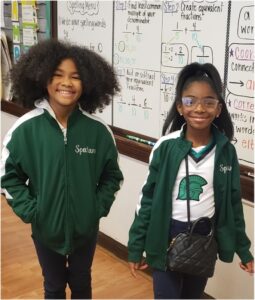
Curriculum
READING, LANGUAGE ARTS, and WRITING
The Open Court Reading Program continues from Fourth into Fifth Grade. It is a research-based comprehensive reading, writing, and language arts program, which uses systematic, explicit instruction, this program helps all students master the foundational skills needed not only to move to proficiency, but also to achieve greater goals of reading independently with confidence inside and outside the classroom. The Student Anthology includes a variety of narrative and informative texts to help students understand concepts such as: key ideas and details; writing as a craft; and the integration of background knowledge and ideas. The Grade 5 Student Anthology is available in print and digitally with audio.5th Grade Themes include: Perseverance, Cycles, Celebrating World Communities, Our Planet, Our Home, Making a Nation, Art and Impact.
MATHEMATICS
Students master the concepts of adding, subtracting, multiplying, and dividing fractions, mixed numbers, decimals, and whole numbers. Students apply this knowledge to create and complete real-world story problems that use all four operations. Students learn rules of multiplication and division using powers of ten, and how to apply these concepts when converting between metric units of measure. Students work with the coordinate plane to create quadrilaterals and triangles and identify their unique properties. Students work with shapes to find side lengths, area, and perimeter of complex figures. Students will use iPads daily to access and practice core concepts.
SCIENCE
Students will integrate technology, engineering, and various field trips to enhance and teach core concepts of physical and earth science. Students study microbiology, learning the basic structures and functions of cells, as well as how these cells have evolved into the unique and diverse living things we now live among. Students explore the many biomes of the Earth and the different ecosystems within them. Students also use data collection to complete activities that strengthen their understanding of the steps of the Scientific Method. Students will learn about ecosystems, animal and plant adaptations, the solar system, forces and motion, and more. Throughout this, students learn to become stewards of the Earth and learn about our duty to protect, restore and observe our local and global ecosystems.
SOCIAL STUDIES
Fifth Grade students will learn about North America before the founding of the United States as well as the first several decades of the republic through the Impact Social Studies Curriculum. By engaging with diverse perspectives and primary sources, students build an understanding of the cooperation and conflicts that defined the early nation. Fifth Grade Chapters/Themes include: How Were the Lives of Native Peoples Influenced by Where They Lived?; What Happened When Diverse Cultures Crossed Paths?; What Is the Impact of People Settling in a New Place?; Why Would a Nation Want to Become Independent?; What Does the Revolutionary Era Tell Us About Our Nation Today?; How Does the Constitution Help Us Understand What It Means to Be an American?; What Do the Early Years of the United States Reveal About the Character of the Nation?; and What Was the Effect of the Civil War on U.S. Society?
TECHNOLOGY/S.T.E.M.
Quarterly research projects entail science, technology, engineering and math core concepts; specific topics are connected and researched based on areas of study in core subjects and to address common core and Illinois Standards. Students use iPads as their primary school supply for all notes and specific information for studying. Smartboards and projectors are used to access online curriculum, promote digital citizenship, and for oral presentations. Approved Providence St. Mel online databases are accessed, utilized and cited throughout the year. A SMART Board is integrated daily to enhance instruction. 4th and 5th grade students participate in National Engineering Week.
Lower School Related Arts
Fostering Creativity and Expression
Our lower school related arts classes inspire creativity, teamwork, and self-expression through music and movement, fostering growth in mind, body, and spirit.
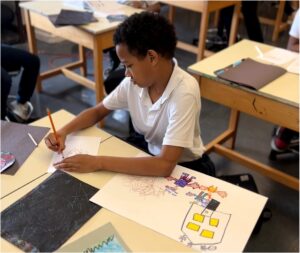
ART
Lower School Art is focused on creative expression and building the belief that everyone is an artist. Students in Kindergarten through 5th grade will learn the basics of the Elements of Art while being introduced to various art mediums and styles. Students will explore topics like sculpture, mosaic, painting, murals, puppets, masks, printmaking, and more.
MUSIC
Students in the grades 1-5 receive music instruction twice weekly. Emphasis is placed on developing skills in reading and performing music. Focus in both reading and performance is based on understanding musical concepts of rhythm, melody, harmony, and expression. Activities in music lessons center on; listening, performing, moving, reading, and creating music; using many styles of music; and understanding the place of music in culture and history. Methodology is drawn from the Kodaly, Orff, and Dalcroze approaches to music education. Students in grades PS/PK and K receive weekly music instruction through the Chime program.
PHYSICAL EDUCATION
Physical fitness, team cooperation, team sports, group games, and Yoga are the focus of this class. Grading is based on Pass/Fail. Gym uniforms will be provided and must be worn.
BIBLE/MUSICAL THEATER
Students in grade 1-5 receive Bible / music theater instruction weekly. Emphasis is placed on developing students’ skills in acting, dancing, and singing, using Bible stories to create the scripts and the curriculum. Students will also have experience with sets, props, and blocking. Additionally, students will compose musical theater songs as a class. During the 4th quarter, the entire Lower School will perform a full-scale musical production including dancing, singing, acting, sets, props, and lighting.
